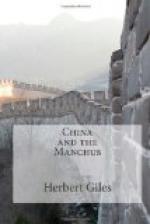Lord Elgin then decided to proceed forth, in the hope of being able to make satisfactory arrangements for future intercourse; but the obstructive policy of the officials on his arrival at the Peiho compelled him to attack and capture the Taku forts, and finally, to take up his residence in Tientsin. The lips, as the Chinese say, being now gone, the teeth began to feel cold; the court was in a state of panic, and within a few weeks a treaty was signed (June 26, 1858) containing, among other concessions to England, the right to have a diplomatic representative stationed in Peking, and permission to trade in the interior of China. It would naturally be supposed that Lord Elgin’s mission was now ended, and indeed he went home; the Emperor, however, would not hear of ratifications of the treaty being exchanged in Peking, and in many other ways it was made plain that there was no intention of its stipulations being carried out. There was the example of Confucius, who had been captured by rebels and released on condition that he would not travel to the State of Wei. Thither, notwithstanding, he continued his route; and when asked by a disciple if it was right to violate his oath, he replied, “This was a forced oath; the spirits do not hear such.”
By June, 1859, another Anglo-French force was at the mouth of the Peiho, only to find the Taku forts now strongly fortified, and the river staked and otherwise obstructed. The allied fleet, after suffering considerable damage, with much loss of life, was compelled to retire, greatly to the joy and relief of the Emperor, who at last saw the barbarian reduced to his proper status. It was on this occasion that Commander Tatnell of the U.S. navy, who was present, strictly speaking, as a spectator only, in complete violation of international law, of which luckily the Chinese knew nothing at that date, lent efficient aid by towing boat-loads of British marines into action, justifying his conduct by a saying which will always be gratefully associated with his name,—“Blood is thicker than water.”




